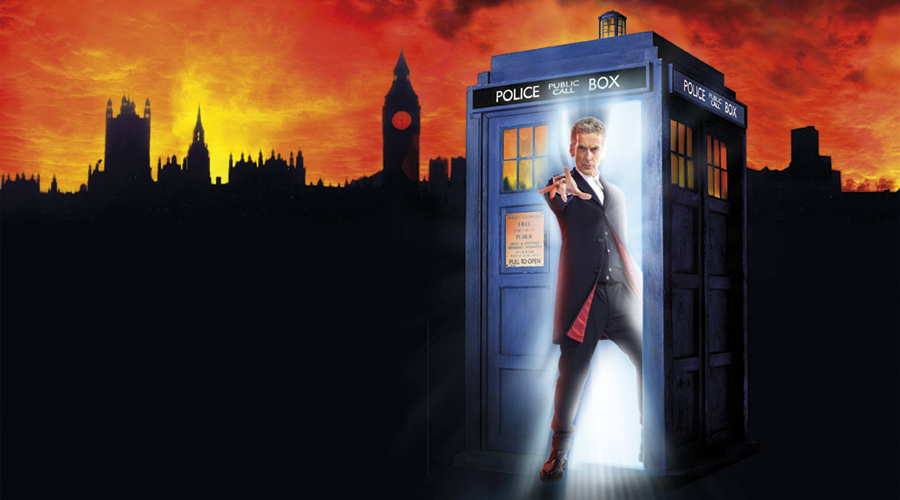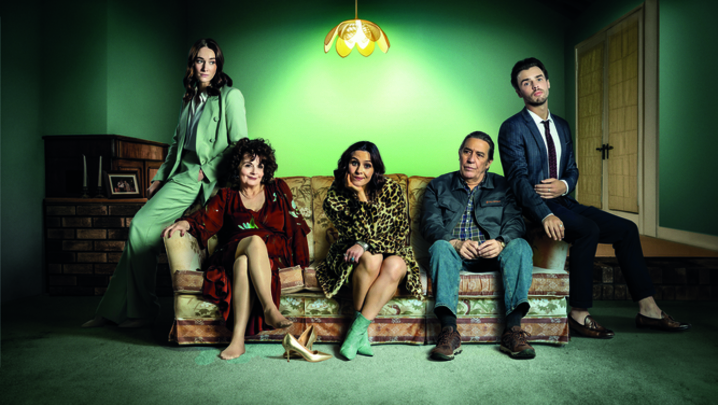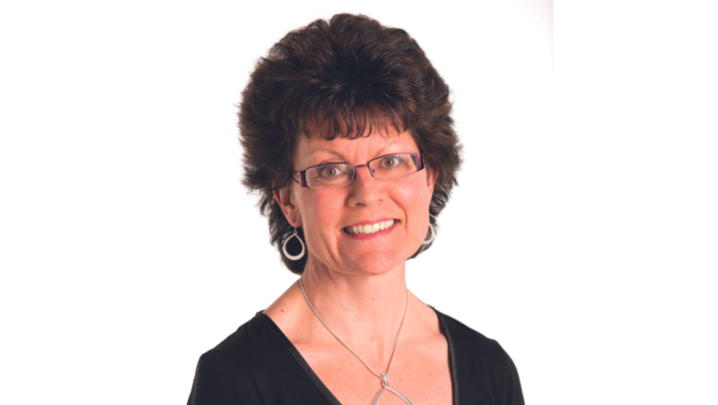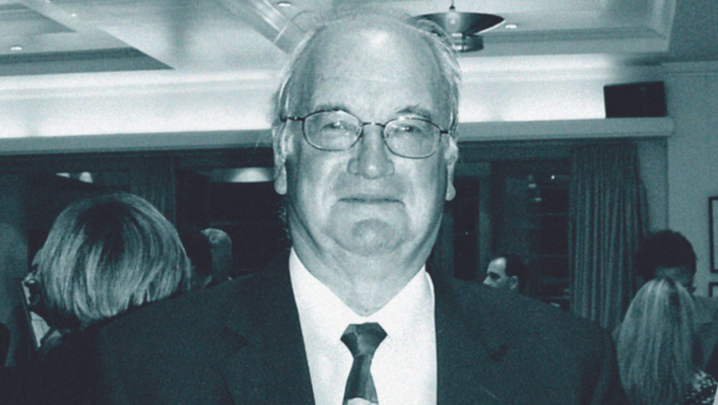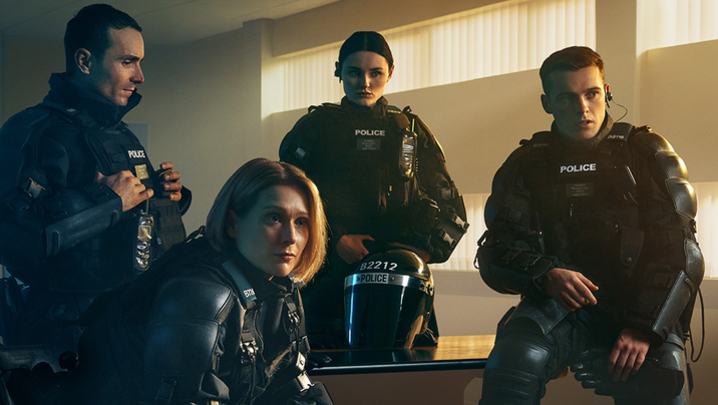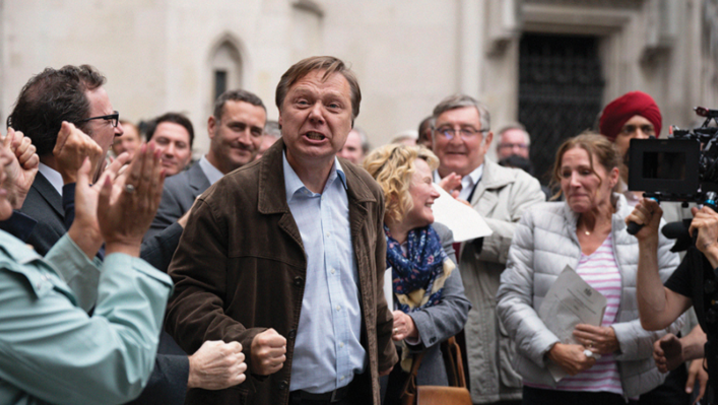The team behind the monster hit reveal how every episode constitutes a regeneration of the sci-fi legend.
In the decade since its revival, Doctor Who has become a TV institution. Time Lords and assistants come and go, but the popularity of the BBC One sci-fi series remains undimmed.
As Peter Capaldi's first series as the Time Lord ended in November, show-runner Steven Moffat and key members of the production team – Executive Producer Brian Minchin, Producer Nikki Wilson, creature effects maestro Rob Mayor and Director Ben Wheatley – sold out an RTS early-evening event, "Doctor Who: anatomy of a hit".
Since Russell T Davies regenerated Doctor Who in 2005, the doctors have been youngish (Christopher Eccleston) and positively youthful in David Tennant and Matt Smith.
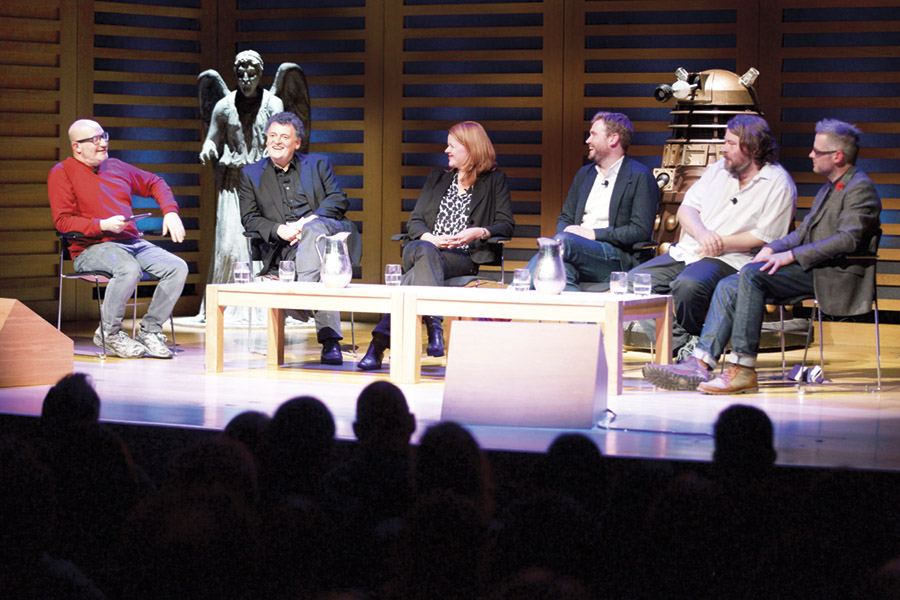 From left, Boyd Hilton, Steven Moffat, Nikki Wilson, Brian Minchin, Ben Wheatley and Rob Mayor. Credit: Paul Hampartsoumian
From left, Boyd Hilton, Steven Moffat, Nikki Wilson, Brian Minchin, Ben Wheatley and Rob Mayor. Credit: Paul Hampartsoumian
Moffat revealed to Heat magazine TV critic and Doctor Who fan Boyd Hilton, who chaired the RTS event, that he felt obliged to age the Doctor when Smith decided to leave at the end of the 2013 series.
"[We didn't want] to cast another attractive young man with entertaining hair – we knew we had to do something different," he said.
Capaldi – who starred in the sci-fi series six years earlier as a Roman merchant saved from the lava and ash of Vesuvius by Tennant's Time Lord – was made for the role, reckoned Moffat.
"The moment the rumour of Peter got out, everyone assumed it would be him. We unveiled him to a nation who already knew and, in a great act of mass performance, affected to be surprised," he recalled.
Like the previous doctors, Capaldi has moulded his own character. "You write [the role] in a surprisingly similar way to the previous doctor and then that actor starts to create a new one. You want to be influenced by the performance hugely," said Moffat.
"None of those guys are pushovers – trust me," he continued. "Matt [Smith] may not have the scary eyebrows, but he's every bit as emphatic. You invite each doctor to have a huge input – that's what you're employing them for. I'm not employing them to act for me – that would be shit."
Capaldi has brought a greater intensity and darker hue to the part – though nothing of foul-mouthed spin doctor Malcolm Tucker from The Thick of It – which Moffat admitted had "ruffled a few feathers".
He added: "Shows don't die by people saying, 'I don't like it now.' Shows die by people saying, 'Oh, it's quite good.' When people say, 'I'm appalled by the new Doctor Who,' [you know] they're watching it."
"You don't know what other people want. You know what you want, so you write everything for yourself."
Moffat argued that the series "has been a reinvention; it has been difficult. It has been designed to make people [say] 'I don't trust him yet'. That makes the show new again."
Movie director Wheatley (see box, left) helmed the all-important first two episodes of the recent series. "Doctor Who, from the very beginning, has been a risk-taking show. You want to give it to [directors] who are going to be the most ambitious and bold – Ben was so clear and direct about what he wanted to do with it," said Executive Producer Minchin.
The series also saw top-notch actors such as Keeley Hawes, Hermione Norris and Michelle Gomez in guest roles. "Doctor Who means so much to writers, directors and actors who normally lead their own shows but are happy to put their other careers to one side and come and do [it]," added Minchin.
Gomez starred as Missy, a female incarnation of the Doctor's legendary foe, The Master, in the two-part series finale. "The idea came before the casting," recalled Moffat, but the writer couldn't find a way to develop the idea and make it more than just a gimmick.
Months later, he saw Gomez's name attached to another part in the series, which other commitments prevented her from accepting.
Visualising her playing Missy helped the showrunner to write the script. "She's an amazing, inventive actress that you simply can't cut away from," said Moffat.
"We got an arch-enemy performance that matches the amazing Roger Delgado, who played the original, and John Simm, who played the new-series version – those are stellar performances. Michelle is every bit as good – she's alarming, scary and extremely funny," he added.
Moffat was adamant that Doctor Who is written neither to a formula nor for a particular audience. "You don't know what other people want. You know what you want, so you write everything for yourself," said Moffat. "You sit down and think, 'What have I always wanted to see in Doctor Who? Well, now I can do it.'"
He added that the writing "is not targeted at anyone other than myself. This is not a formula for huge success – I've written many other failures on the same basis, but, now and then, you write something that everyone else happens to be into at the moment and that's great. It's a lovely coincidence, but you can only ever write the joke that makes you laugh."
In the decade since Doctor Who returned to BBC One, a mini-industry has built up around the show's production base in South Wales.
"The headline is that [the ratings] have barely changed since it came back... The way people watch it has changed."
"There's a crew in Cardiff that has grown up with the show, so there's an awful lot of talent and expertise that knows the show inside out," said Producer Nikki Wilson.
The talent is available, but money and time are in short supply (a single episode is made in around two weeks).
"What is extraordinarily expert about the work of all branches of our effects department is how great they are within quite savage limitations," said Moffat. "We have to conceal those limitations and work cleverly within them."
"There isn't a paradigm episode that you keep remaking. Every aspect of the script, effects, the sets and designs, the cast and the style the directors bring to it, is different every time – that's what makes it a great show."
The experience of the team is key to getting the programme made on time, within budget and to a quality standard. "You trust in those people to bring ideas to the table that are going to bring it to life," said Wilson.
Millennium FX Director Mayor (see box, right) and many of his team are veterans of Doctor Who.
Saturday-night ratings have dipped during the current series but, when catch-up views are added, total audiences are at the same level as the past few runs.
Over the course of series 8, the consolidated audience averaged 7.4 million viewers, an increase of 39% on the overnight figures.
"The headline, boring though it is, is that [the ratings] have barely changed since it came back," said Moffat. "The way people watch it has changed."
Worldwide, audiences have been growing, with ratings surging in the US during the Capaldi era – consolidated figures for the first 10 episodes were almost a quarter higher than the previous run on BBC America. "I would be working hard, even as a Scot, to be disappointed by that," said Moffat.
The RTS early-evening event 'Doctor Who: anatomy of a hit' was held at King's Place in central London on 11 November, and produced by Sally Doganis and Barney Hooper.
Directing the Doctor
Long-time Doctor Who fan Ben Wheatley jumped at the chance to direct two episodes – series opening period piece Deep Breath and the futuristic Into the Dalek – in the latest series.
The movie director, who wowed both critics and audiences with his macabre movies Kill List and Sightseers, discussed the challenges of working in TV at the RTS event.
'Once I realised I was going to get to do it, I started to become terribly afraid. It was quite a big deal to do the first two with Capaldi. Initially, just knowing I was going to work with the new Doctor [had] a whole level of terror to it.
'Then, reading the scripts and seeing how involved they were in terms of action and stuff... oh, God. Once I met the team, and they started to talk it through, it was fine,' said Wheatley.
'The show is different every episode, so you can drop different styles into it and it's not going to damage the series. And I couldn't believe I got a Dalek episode.
'I storyboarded the episodes [heavily] because I was particularly worried about the level of effects work. There was not much margin for error. Basically, it's about page count. The last film I did [we shot] three pages a day; Doctor Who is between four and 11.
'On three pages you can do a lot of coverage; on 11, you can do none. So you've just got to get it right. I planned it as much as I could and when I look back at my scrappy drawings, they are close to what it [became].
'I thought there would be more pressure with the first two episodes, to be honest, but when I was making them [there was a lot] of freedom in terms of how I shot them. I think it was because everyone was in accord, which was good.
'I've worked in other situations, where people are looking over your shoulder at the monitor and asking, "Why did you do it like that?", which makes you go insane.
'It was very open and free on Doctor Who.'
Creating the creatures
Millennium FX Director Rob Mayor and his team have provided the prosthetics and animatronics for Doctor Who's weird and wonderful creatures since the series returned in 2005.
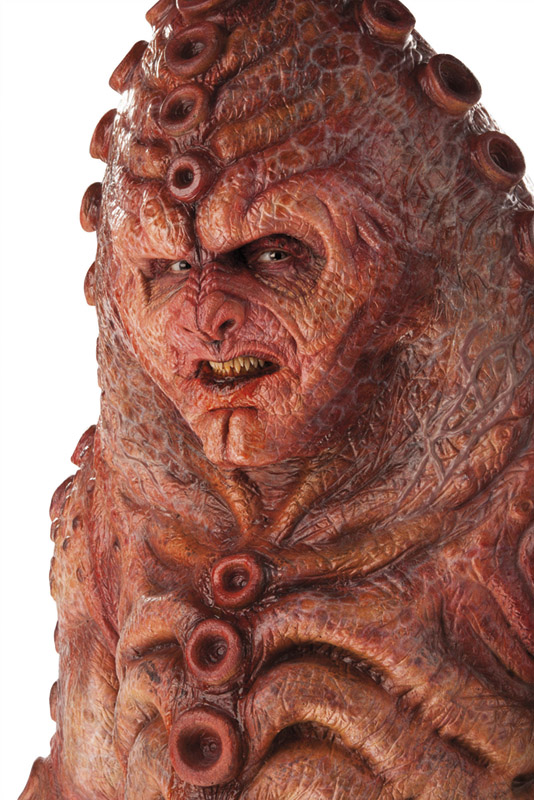 Dr Who Monster. Credit: BBC
Dr Who Monster. Credit: BBC
'We have such an established team – many of us have been on the show since it came back. It's hard to faze the team, because we're so immersed in the world of Doctor Who,' Mayor explained.
'Because it's a TV show, turnaround times are quite tight, so sometimes the first time anyone has seen a finished creature is the first day of shooting, which is very scary from a production point of view.
'I've been working at 4:00am spraying Cybermen suits, but, as far as I know, everything has turned up on the set dry, or at least touch dry.
'The great thing about Doctor Who is that the monsters, scripts and environments are so varied that we get a chance to make a whole range of creatures and use a whole range of skills. Because we're all big monster fans, to get the opportunity to make the mummy for the Orient Express episode was fantastic.
'It's most challenging when we get the chance to [work on] classic Doctor Who monsters. There's an emotional attachment to those characters from past history –there's a sense of anticipation as soon as we step out of the workshop, because we've redesigned something.'

